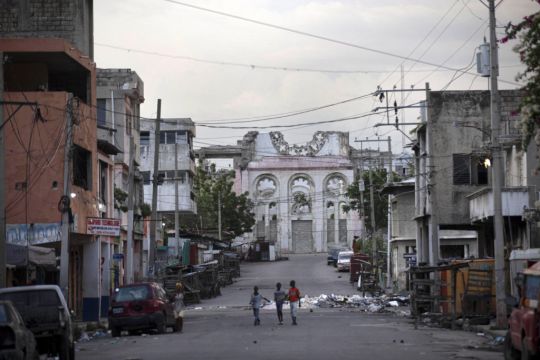Haiti stumbled into an uncertain future after the assassination of President Jovenel Moise, followed by a gunfight in which authorities said police killed four suspects, detained two others and freed three officers being held hostage.
Officials pledged to find all those responsible for the pre-dawn raid on Mr Moise’s home early on Wednesday in which the president was shot to death and his wife, Martine, critically wounded.
She was flown to Miami for treatment.
“The pursuit of the mercenaries continues,” Leon Charles, director of Haiti’s National Police, said on Wednesday night in announcing the arrest of suspects.
“Their fate is fixed: They will fall in the fighting or will be arrested.”

Officials did not provide any details about the suspects, including their nationalities, nor did they address a motive or say what led police to them.
They said only that the attack condemned by Haiti’s main opposition parties and the international community was carried out by “a highly trained and heavily armed group”, whose members spoke Spanish or English.
The country’s prime minister Claude Joseph assumed leadership of Haiti with the backing of police and the military, and decreed a two-week state of siege following Mr Moise’s killing, which stunned a nation grappling with some of the Western Hemisphere’s highest poverty, violence and political instability.
Inflation and gang violence have spiralled upward as food and fuel grew scarcer in a country where 60% of Haitians earn less than two US dollars a day.
The increasingly dire situation comes as Haiti is still trying to recover from the devastating 2010 earthquake and Hurricane Matthew in 2016 following a history of dictatorship and political upheaval.
“There is this void now, and they are scared about what will happen to their loved ones,” said Marlene Bastien, executive director of Family Action Network Movement, a group that helps people in Miami’s Little Haiti community.
She said it was important for the administration of US President Joe Biden to take a much more active role in supporting attempts at national dialogue in Haiti with the aim of holding free, fair and credible elections.
Ms Bastien said she also wants to see participation of the extensive Haitian diaspora: “No more band-aids.
“The Haitian people have been crying and suffering for too long.”

Haiti had grown increasingly unstable under Mr Moise, who had been ruling by decree for more than a year and faced violent protests as critics accused him of trying to amass more power while the opposition demanded he step down.
According to Haiti’s constitution, Mr Moise should be replaced by the president of Haiti’s Supreme Court, but the chief justice died in recent days from Covid-19, leaving open the question of who might rightfully succeed to the office.
Mr Joseph, meanwhile, was supposed to be replaced by Ariel Henry, a neurosurgeon who had been named prime minister by Mr Moise a day before the assassination.
Mr Henry said in a brief interview that he is the prime minister, calling it an exceptional and confusing situation.
In another interview with Radio Zenith, he said he had no dispute with Mr Joseph.
“I only disagree with the fact that people have taken hasty decisions … when the moment demands a little more serenity and maturity,” he said.
Mr Moise had faced large protests in recent months that turned violent as opposition leaders and their supporters rejected his plans to hold a constitutional referendum with proposals that would strengthen the presidency.
On Thursday, public transportation and street vendors remained scarce, an unusual sight for the normally bustling streets of Port-au-Prince.
Marco Destin, 39, was walking to see his family since no buses, known as tap-taps, were available.
He was carrying a loaf of bread for them because they had not left their house since the president’s killing out of fear for their lives.
“Every one at home is sleeping with one eye open and one eye closed,” he said.
“If the head of state is not protected, I don’t have any protection whatsoever.”

Mr Destin said Haiti has always been a complicated country and that he was not sure what the upcoming days would bring.
“Haiti doesn’t know what direction it’s heading in right now,” he said.
“To be honest, I don’t know what the solution is.
“There’s always been a fight for power.”
Gunfire rang out intermittently across the city hours after the killing, a grim reminder of the growing power of gangs that displaced more than 14,700 people last month alone as they torched and ransacked homes in a fight over territory.
Robert Fatton, a Haitian politics expert at the University of Virginia, said gangs were a force to contend with and it is not certain Haiti’s security forces can enforce a state of siege.
“It’s a really explosive situation,” he said, adding that foreign intervention with a UN-type military presence is a possibility.
“Whether Claude Joseph manages to stay in power is a huge question. It will be very difficult to do so if he doesn’t create a government of national unity.”
Mr Joseph told the AP that he supports an international investigation into the assassination and believes elections scheduled for later this year should be held, as he promised to work with Mr Moise’s allies and opponents alike.
“Everything is under control,” he said.







